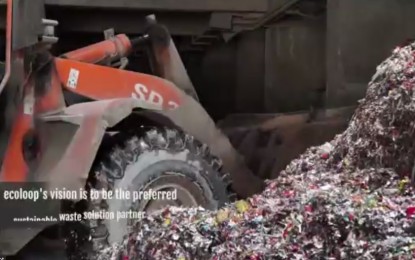
WASTE CO-PROCESSING. Republic Cement's co-processing arm, ecoloop, collects residual waste from organizations and communities that can be converted to alternative fuels and be used as an ingredient in cement making. The ecoloop eyes to co-process residual waste in Republic Cement’s five facilities nationwide. (Screengrab from Republic Cement's ecoloop briefing)
MANILA – Republic Cement president and chief executive officer Nabil Francis said the cement firm aims to partner with more companies and communities for co-processing to address the waste management crisis in the country through its co-processing arm, “ecoloop”.
“We would like to commit to a very ambitious target for next year, it’s to co-process not less than 10 million equivalent sachets of plastic bags per calendar day starting at the very beginning of next year,” Francis said in an online briefing Thursday.
Francis said the country produces 40,000 tons of solid waste per day, and 9,000 tons of which are generated in Metro Manila.
Of the solid waste, 50 percent are biodegradable, 30 percent are recyclable, and less than 20 percent are residual waste that either goes to landfills with the risks of contamination or to the ocean.
The ecoloop eyes to co-process residual waste in Republic Cement’s five facilities nationwide.
Ecoloop director Angela Valencia said co-processing is better than incineration, as the latter still leaves 30 percent ash that ended up in landfills.
Co-processing recovers the thermal and mineral properties of qualified waste materials that can be converted to alternative fuels. Through this, Republic Cement reduces its cement manufacturing dependence on fossil fuels like coal.
Any by-products of co-processing like ash are fully integrated into the clinker, a key ingredient of cement.
Valencia said Republic Cement incentivizes its partner companies and communities by giving 10 cement bags for every ton of shredded plastic provided to ecoloop.
Interested organizations and local government units may reach ecoloop through ecoloop@republiccement.com for this waste management effort. (PNA)
